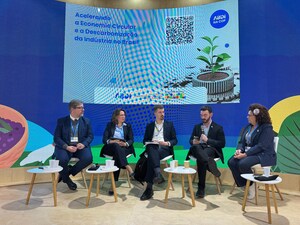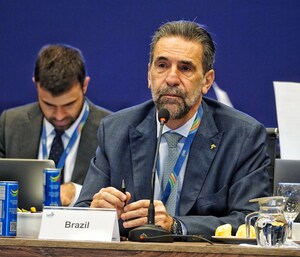Itaipu participates in the launch of the Sustainable Solidary Kitchens
FOZ DO IGUAÇU, Brazil, Oct. 23, 2024 /PRNewswire/ -- Federal Government authorities and Itaipu Binacional signed a memorandum of understanding for the Sustainable Solidary Kitchens initiative, which provides for the supply of "clean cooking" equipment for preparing meals and the installation of biodigestors. The equipment will transform organic waste into biogas, which will be used to cook food, thus promoting a cycle of sustainable use. The event was held in parallel with the G20 Energy Transitions Working Group meeting, in Foz do Iguaçu (PR).
The initiative was created within the scope of the Federal Government's Solidary Kitchen Program, based on a partnership between the Ministry of Development and Social Assistance, Family and Fight against Hunger, the Ministry of Mines and Energy and the General Secretariat of the Brazilian Presidency. The action, which is linked to the UN's Sustainable Development Goal 7 – clean and affordable energy and SDG 2 – zero hunger and sustainable agriculture, has the support of Itaipu Binacional.
"This project is extremely important, as it addresses a subject that is on the G20 agenda: the energy transition. The number of women who are injured is extremely high. The existence of the solidary economy project is crucial for the socialization of food. We will start with seven kitchens, but we intend to reach 100", stated Verri.
The first lady, Janja Lula da Silva, who proposed the initiative, was unable to attend but sent a message. The text highlighted the importance of the project. "It is unacceptable that women and girls are at risk of burns, lung diseases and exhausting work in the search for supplies, whether food or fuel. In addition, they are more vulnerable to sexual violence, since many have to walk long distances to obtain, in addition to food and water, materials such as firewood and charcoal."
More than 2.3 billion people worldwide lack access to clean energy sources. The project prioritizes kitchens run by women, especially black women. The seven units selected to receive the biodigestors were chosen considering the capacity to offer meals and the space to install the biodigestor. "Solidary kitchens have the power to transform lives, freeing women from poverty and suicide and teaching them about their value and rights. This project is not just about feeding; it is about education, solidarity and empowerment", said Andréa Elias de Sousa Alves, representative of Sol Nascente Solidary Kitchen.







Share this article